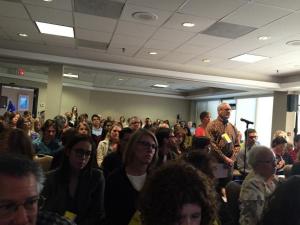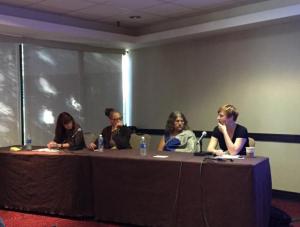By Sylvia Kantor
Bird flu in Southeast Asia, the 2011 tsunami in Japan, infections transferred in hospitals and AIDS in the rural south. Facts are only part of these stories. When told from the perspective of the people impacted by the facts, science stories come alive and may even catalyze change.
The standing-room-only workshop on reframing the narrative in science stories was led by June Cross, Sheila Jasanoff, Maryn McKenna, and Maggie Koerth-Baker at ScienceWriters2015 in Cambridge, Mass.Harvard professor Sheila Jasanoff studies science and technology in society. She thinks that scientists operate within a deficit model, the belief that most problems in society rise from the fact that society on the whole doesn’t know enough about the science that’s going on in the world.
“The reason to tell these other stories is in part to deflate that view of knowledge,” Jasanoff said. “Because it tends to highlight scientific knowledge as the only form of relevant knowledge and yet it turns out over and over again … that scientific fact is operating in a much wider system in which many other kinds of knowledge are at work as well.”
After learning that black women of childbearing age are dying from AIDS more than any other disease in rural south and that if you’re diagnosed in most of the nine Deep South states you’re likely to be dead in five years, filmmaker June Cross decided to investigate.
“You can get enough studies on HIV and AIDS to fill this room and then some,” Cross said, “but you need to find the people who undergird those studies.”
Cross headed south and by reaching out to advocacy groups, found 62-year-old grandmother Wilhemina Dixon. The film Wilhelmina’s War tells the story of the challenges Dixon faces in caring for her granddaughter who was born HIV-positive in the middle of nowhere with little access to health care and education.
Writing about antibiotic-resistant bacteria passed in hospitals, Myrna McKenna learned that reducing transmission hinged on the janitors because they clean the surfaces where bacteria cling.“The most dire threat to hospital hygiene in probably the last 30 years becomes the purview not of the folks with the multiple graduate degrees, but the least paid, least regarded, most disposable members of the hospital hierarchy,” McKenna said. “When you turn that story around and find out what’s important to those janitors it becomes a profoundly different story.”
McKenna made a plea to do more shoe leather reporting — meeting people face to face — in order to discover their reality on the ground.
In doing so however, she does not say that the role of the journalist to tell people how to solve problems.
“I’m not competent to define how and it’s not my job,” she said. “As a journalist I am not an advocate except for truth and complexity.”





